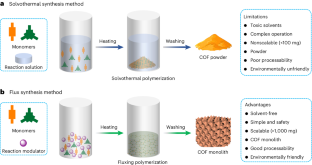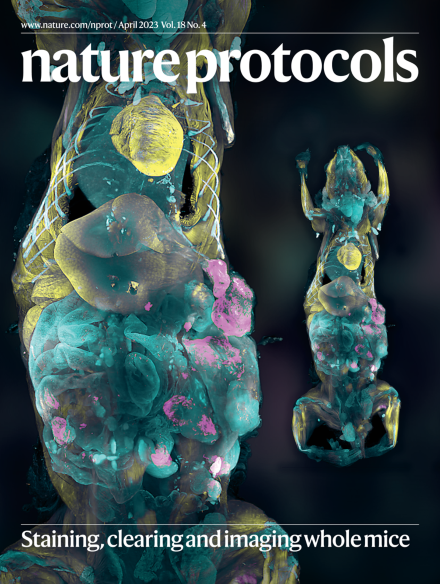Flux synthesis of two-dimensional covalent organic frameworks
IF 13.1
1区 生物学
Q1 BIOCHEMICAL RESEARCH METHODS
引用次数: 0
Abstract
Covalent organic frameworks (COFs) are crystalline porous polymers constructed from organic building blocks into ordered two- or three-dimensional networks through dynamic covalent bonds. Attributed to their high porosity, well-defined structure, tailored functionality and excellent chemical stability, COFs have been considered ideal sorbents for various separation applications. The synthesis of COFs mainly employs the solvothermal method, which usually requires organic solvents in sealed Pyrex tubes, resulting in unscalable powdery products and environmental pollution that seriously limits their practical applications. Herein, our protocol focuses on an emerging synthesis method for COFs based on organic flux synthesis without adding solvents. The generality of this synthesis protocol has been applied in preparing various types of COFs, including olefin-linked, imide-linked, Schiff-based COFs on both gram and kilogram scales. Furthermore, organic flux synthesis avoids the disadvantages of solvothermal synthesis and enhances the crystallization and porosity of COFs. Typically, COF synthesis takes 3–5 d to complete, and subsequent washing procedures leading to pure COFs need 1 d. The procedure for kilogram-scale production of COFs with commercially available monomers is also provided. The resulting COFs are suitable for separation applications, particularly as adsorbent materials for industrial gas separation and water treatment applications. The protocol is suited for users with prior expertise in the synthesis of inorganic materials and porous organic materials. This protocol describes a flux synthesis approach for two-dimensional covalent organic frameworks. Compared with other approaches, this method does not use solvents, making it environmentally friendly, and is scalable up to the kilogram scale.


二维共价有机框架的通量合成。
共价有机框架(COFs)是一种结晶多孔聚合物,由有机结构单元通过动态共价键构建成有序的二维或三维网络。COFs 具有高孔隙率、明确的结构、定制的功能性和出色的化学稳定性,因此被认为是各种分离应用的理想吸附剂。COFs 的合成主要采用溶热法,这种方法通常需要在密封的派莱克斯管中使用有机溶剂,因此会产生不可扩展的粉末状产品,并造成环境污染,严重限制了其实际应用。在此,我们的方案重点介绍一种基于有机助熔剂合成的新兴 COFs 合成方法,无需添加溶剂。这种合成方法具有通用性,可用于制备各种类型的 COF,包括克级和公斤级的烯烃连接型、亚胺连接型、席夫基 COF。此外,有机助熔剂合成避免了溶热合成的缺点,提高了 COF 的结晶度和多孔性。通常情况下,COF 合成需要 3-5 天才能完成,随后的洗涤程序需要 1 天才能得到纯 COF。生产出的 COF 适用于分离应用,特别是用作工业气体分离和水处理应用的吸附材料。该方案适合具有合成无机材料和多孔有机材料专业知识的用户。
本文章由计算机程序翻译,如有差异,请以英文原文为准。
求助全文
约1分钟内获得全文
求助全文
来源期刊

Nature Protocols
生物-生化研究方法
CiteScore
29.10
自引率
0.70%
发文量
128
审稿时长
4 months
期刊介绍:
Nature Protocols focuses on publishing protocols used to address significant biological and biomedical science research questions, including methods grounded in physics and chemistry with practical applications to biological problems. The journal caters to a primary audience of research scientists and, as such, exclusively publishes protocols with research applications. Protocols primarily aimed at influencing patient management and treatment decisions are not featured.
The specific techniques covered encompass a wide range, including but not limited to: Biochemistry, Cell biology, Cell culture, Chemical modification, Computational biology, Developmental biology, Epigenomics, Genetic analysis, Genetic modification, Genomics, Imaging, Immunology, Isolation, purification, and separation, Lipidomics, Metabolomics, Microbiology, Model organisms, Nanotechnology, Neuroscience, Nucleic-acid-based molecular biology, Pharmacology, Plant biology, Protein analysis, Proteomics, Spectroscopy, Structural biology, Synthetic chemistry, Tissue culture, Toxicology, and Virology.
文献相关原料
公司名称
产品信息
阿拉丁
PMA
阿拉丁
Sodium hydroxide (NaOH)
阿拉丁
Ammonia water
 求助内容:
求助内容: 应助结果提醒方式:
应助结果提醒方式:


